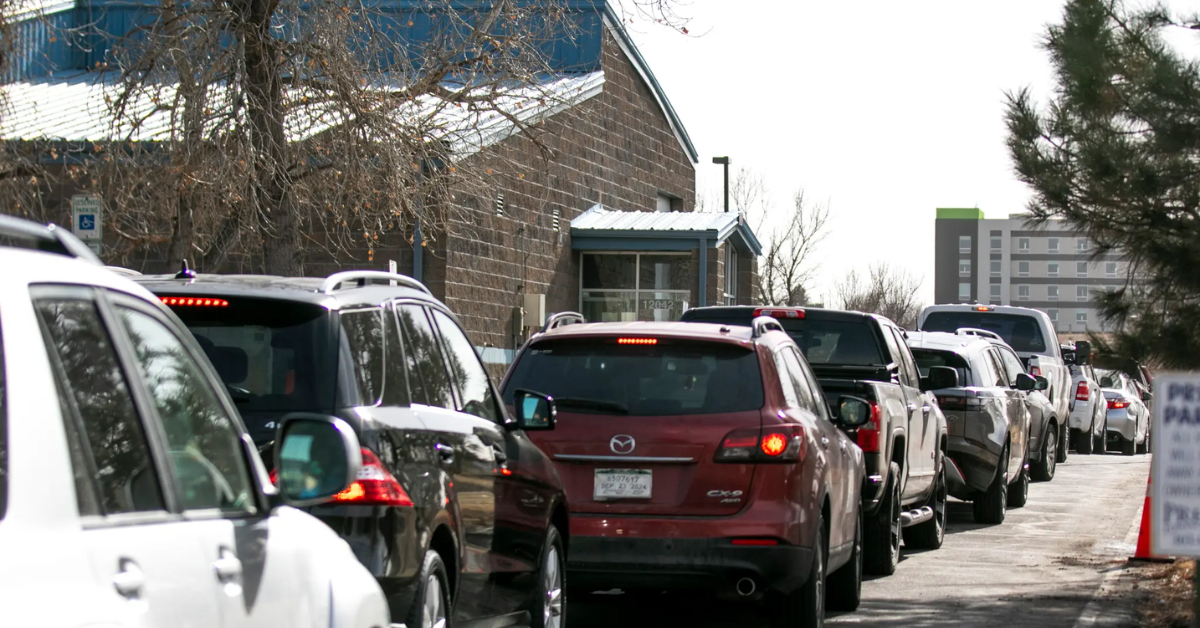Colorado drivers, who have long endured waiting in long lines for their required emissions tests, will soon have a much easier way to handle this task. Starting in 2026, self-serve kiosks will be available, giving drivers a convenient, 24-hour-a-day option to get their emissions testing done quickly and efficiently.
This new development is part of two significant updates to the state’s vehicle emissions testing program, approved recently by the Colorado Air Quality Control Commission.
Steve McCannon, the mobile sources program director for the Air Pollution Control Division at the state health department, highlighted that the goal of the kiosks is to enhance convenience for drivers. “The key piece of this is increased customer convenience for the motoring public,” McCannon explained. “We know that we need to improve that. It’s a sign of the times. And we have a technology now that we can deploy.”
Emissions tests are mandatory for drivers in the Denver metro area and the north Front Range due to the region’s ground-level ozone levels not meeting federal air quality standards. Currently, drivers can go to one of the 18 brick-and-mortar Air Care Colorado locations or use Rapid Screen roadside tests to meet the emissions test requirement. With the addition of self-serve kiosks, drivers will have a third option to complete the testing process.
How the New Kiosks Will Work
The self-serve kiosks are designed to be user-friendly and efficient, making the process much faster and more convenient for Colorado drivers. The kiosks will be available starting in 2026, and they will be accessible to drivers with vehicles between seven and 11 years old. To use the kiosk, drivers will need to plug an on-board diagnostic cord into their vehicle, which will automatically run the emissions test.
Once the test is completed, drivers will be able to pay using a credit card and will receive a printout of the results. The process will be quick and easy, allowing drivers to avoid long wait times at traditional emissions testing centers. McCannon emphasized that this new system is designed to reduce the number of cars waiting in line at physical testing locations. “That’s it,” McCannon said, “It’s going to pull a lot of volume out of the lanes.”
While the state has not yet confirmed the exact number of kiosks or their specific locations, McCannon mentioned that possible locations include current Air Care Colorado sites, local government offices, and even grocery stores. This is similar to the placement of kiosks for other services by the state Division of Motor Vehicles, such as vehicle registration renewals. McCannon expects that these self-serve kiosks will be widespread, offering drivers a convenient option to get their emissions testing done at any time of day.
Stricter Standards for Diesel Vehicles: Tackling “Rolling Coal”
Along with the introduction of self-serve kiosks, the Colorado Air Quality Control Commission has also approved stricter emissions standards for diesel vehicles. These changes are particularly focused on reducing harmful pollutants that diesel-powered trucks release, including black smoke caused by a practice known as “rolling coal.”
Rolling coal is a controversial practice where diesel engines are intentionally modified to produce large amounts of black smoke, often as a display of power or for entertainment purposes. While this practice was made illegal in Colorado years ago, it has still been an issue, with just 43 citations issued as of last year. The state is now tightening its standards to address this ongoing problem.

The state has lowered the opacity standard for diesel exhaust. Opacity is a measure of how much smoke and pollutants are emitted from a vehicle’s exhaust.
Previously, the allowable opacity level was 40 percent, but the state is now lowering it to 20 percent, measured over five seconds. This change is expected to lead to about 500 additional diesel vehicles failing the opacity test each year.
These vehicles will either need to undergo repairs or be taken off the road. Many of these failures will likely be caused by vehicles that have been tampered with to produce excessive black smoke intentionally. McCannon noted, “It will catch some coal rollers,” referring to vehicles that emit large amounts of black smoke as part of the rolling coal practice.
The stricter opacity rules are designed to improve air quality in Colorado, particularly in areas where air pollution is a serious issue. While this measure may affect some vehicle owners, it is a crucial step in reducing the harmful impact of diesel exhaust and improving the state’s overall air quality.
Why These Changes Matter
These updates to Colorado’s vehicle emissions testing program represent an important step toward improving both the convenience for drivers and the state’s efforts to reduce air pollution.
The introduction of self-serve kiosks will provide a quicker and more accessible option for drivers to meet their emissions testing requirements, which could significantly reduce the wait times at traditional testing centers. This could be especially helpful for busy drivers who have difficulty finding time to visit a testing location during normal hours.
At the same time, stricter regulations for diesel vehicles will help to cut down on the harmful effects of excessive pollutants, particularly from vehicles that are tampered with to produce black smoke intentionally. With the new opacity standards, Colorado is aiming to create cleaner air and a healthier environment for its residents.
Overall, the combination of convenient self-serve kiosks and stricter emissions standards for diesel vehicles signals that Colorado is serious about improving air quality and making it easier for residents to comply with emissions testing requirements.
Looking Ahead: The Future of Colorado’s Emissions Testing
As we move toward 2026, when the self-serve kiosks will become available, Colorado drivers can expect a more streamlined emissions testing experience. With 24-hour access to kiosks, the process will be quicker, more convenient, and available at all hours of the day. While the state is still working out the specifics of kiosk locations, the goal is to make emissions testing more accessible and less time-consuming for all drivers.
In the long run, these updates will not only help to clean up the air in Colorado but also provide a model for other states and regions to follow in making their emissions testing processes more efficient and convenient. Whether it’s through technology like self-serve kiosks or stricter regulations for diesel vehicles, Colorado is taking proactive steps to improve air quality and enhance the experience for drivers.
Disclaimer: This article has been meticulously fact-checked by our team to ensure accuracy and uphold transparency. We strive to deliver trustworthy and dependable content to our readers.







Leave a Comment